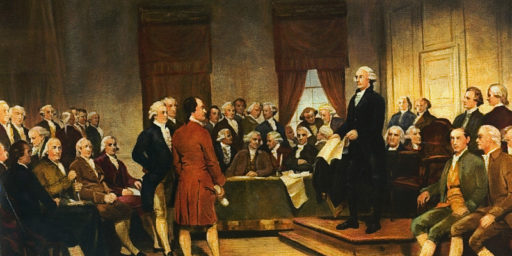What Elections Mean
Jonathan Bernstein captures my reaction to the constant attempt to glean widespread meaning from isolated election results quite nicely:
Hey, pundits: don’t tell us what the election “means.” Don’t try to interpret. Don’t try to figure out “what the electorate is saying.” We don’t know those things. Sometimes because we have insufficient information (we didn’t even have exit polls, but exit polls or not you’re not going to be able to do a real analysis of the electorate’s preferences overnight). Sometimes because the thing, like the “meaning” of an election, doesn’t exist. It’s especially hard to extrapolate from a random group of primaries that happened to be on one day to general elections months from now (for example, an “anti-incumbent” vote is something very different when it’s a dedicated Democrat voting against a moderate Democratic incumbent in a primary than it is for that same Democrat to vote for a Republican in November, and willingness to do one thing may not at all signal willingness to do the other). It’s hard enough to extrapolate from this set of primaries to all primaries.
What does exist, and what we do have some information about, are the effects of elections, and I think it’s perfectly reasonable for everyone to start figuring that out right away. We can figure out, or at least have some informed speculation, about whether a result is good for the Republicans or good for the Democrats (see Jonathan Chait on Nevada). We can talk about likely policy effects. We can talk about likely interest group reactions (that’s the good part of Ambinder’s piece). Again, all of this is even easier when it comes to general elections, when we can have a pretty good idea of the policy implications of election results.
They’re as likely to take this advice, of course, as the financial analysts who try to explain each day’s movement in the various stock index averages as a response to the day’s events.




